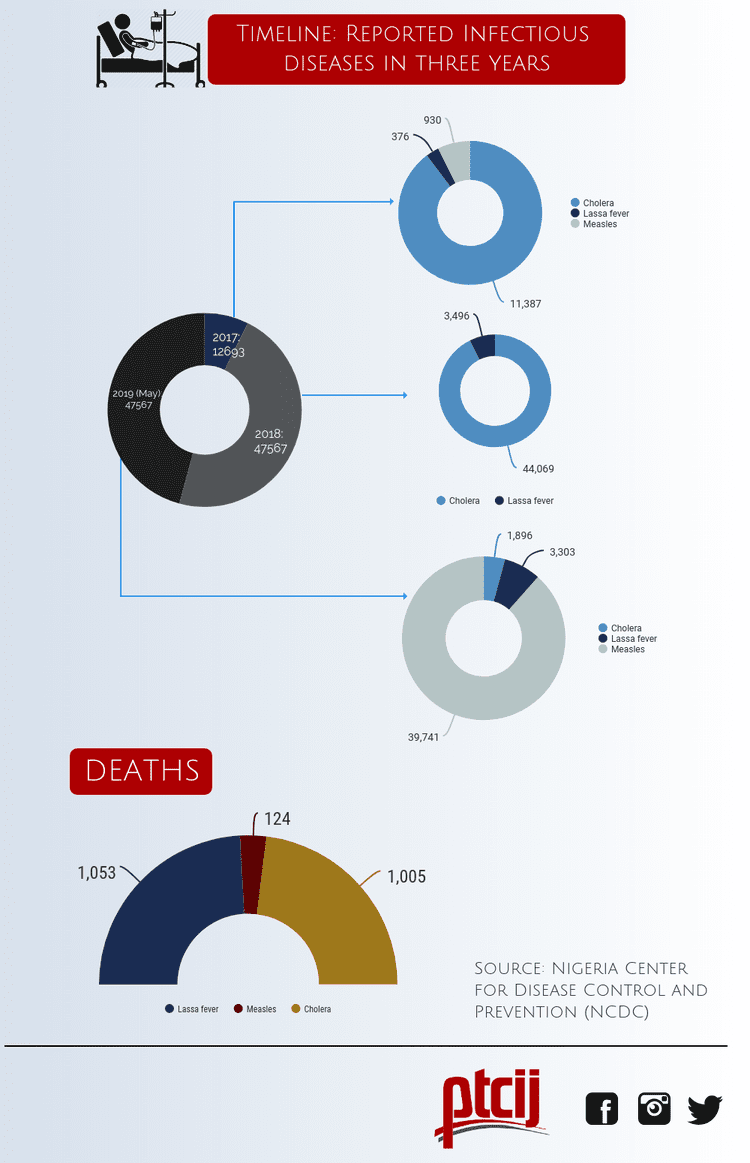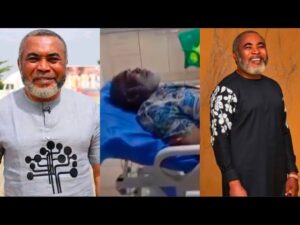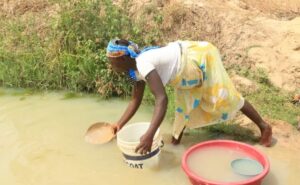Not less than 99,000 cases of infectious diseases were recorded in Nigeria in the past three years, reports revealed.
Top of the ailments recorded were cholera, measles and Lassa fever.
Other diseases that affected a large number of Nigerians during the period include cerebrospinal meningitis, yellow fever and monkeypox.
About 1022 suspected Lassa fever cases were reported between 2016 and 2017. Of these, 308 were confirmed cases with 78 deaths recorded. Cholera had 5,264 suspected cases with 15 confirmed cases and 140 deaths reported. About 930 cases of measles were recorded.
In 2018, 3,498 suspected cases of Lassa fever were recorded, 633 were confirmed positive while 171 deaths were recorded. There were 42,466 suspected cholera cases with 830 deaths.
As of August 26, 2019, 3,303 suspected cases of Lassa fever had been reported. About 651 were confirmed positive and 145 deaths recorded. For cholera, there were 1,896 suspected cases including 35 deaths. Measles recorded 39,741 suspected cases, 1,438 positive cases with 124 deaths.
A total of 304 deaths have been recorded in 2019 so far. These include 145 deaths from Lassa fever, 124 from measles and 35 from cholera.


[Inforgraphics credit: Adebowale Adedigba]
This scary situation, according to Prevent Epidemics website, remains challenging as it says ”Nigeria is not ready to find, stop and prevent epidemics.”
The World Health Organisation report on the Joint External Evaluation (JEE) ranked Nigeria 39th in the ‘preparedness for infectious ‘diseases’.
Outbreaks have been recorded in the country in the past few months. These include: an environmental strand of poliovirus seen in Makoko area of Lagos, Itire and Maracana canals in the state; cholera outbreaks in three local government areas in Adamawa; poliovirus type was reported in Ilorin East, Kwara State.
Insufficient budgetary allocation?
The level of disease preparedness and policy commitment of any country relatively depends on the level of investment in disease surveillance and outbreak response, experts say.
While the Nigerian government has seized the period of the incidences to mouth its commitment to disease control, the reality of its budgetary allocation is at least an example of the parody.
In 2017, N1.4 billion was budgeted to handle issues of diseases and campaigns, while in 2018, a budget line item with reference number ERGP25112686 under the Ministry of Health had a sum of N 209.6 million as allocation for disease surveillance.
Another line item, ERGP25112686, had N1.5 billion as allocation for procurement of disease outbreak emergency vaccines.
According to the data sourced from Dataphyte, N1.5 billion was appropriated to the Nigeria Centre for Disease Control Abuja in 2019. This amount is only 0.4 per cent of the entire budget of the ministry of health in 2019.
This is even more pathetic as the total health ministry budget itself is 4.2 per cent of the total national budget.
Global pledge
In April 2001, during the Abuja declaration, the African Union met and pledged to set a target of allocating at least 15 per cent of its annual budget to improve the health sector.
According to the World Health Organisation, ten years after the declaration in 2011, only one African country reached this target, 26 countries had increased the proportion of government expenditures allocated to health and 11 had reduced it while in the remaining nine countries, there was no obvious trend.
The health MDG indicator revealed that Nigeria and 17 other countries belong to the off-track health MDGs where the total spending of government per capita is less than or equal $33.
Need for more budgetary allocation
Eseigbe David, a medical practitioner with the Federal Medical Center, Owo, Ondo State, said there is a need for more budgetary allocation to battle infectious ailments.
“The scourge of Lassa fever, for instance, is a great burden to society in general. Having now known that the disease is with us and has been with us for 50 years with its attendant morbidity and mortality, it’s very important to attack it headlong.
Lassa fever
‘’In the outbreaks of 2017, 2018 and 2019 for instance, the deaths from the disease recorded is increasing hence the need for the government’s involvement to reduce its burden as another outbreak might just be looming,’’ he said.
He also gave possible solutions the government may want to explore.
“The government, at all levels, should budget a sizeable amount of money to combat these diseases. It takes an average of N400,000 to N1.5 million to treat a case of Lassa fever with complements of standard laboratory and infection control centre and staff who are trained and retrained.
“Resuscitative equipment, dialysis machines and drugs used for treatment are not easy to come by. Hence the government should invest more in epidemics. Also, there should be a political will to vote money in setting up diagnostic laboratories across the geopolitical zones to test for any suspected infectious disease.
‘’This will enhance early diagnosis and reduce complications that arise from the late presentation. These laboratories should be well equipped with modern machines and reagent with appropriate manpower.
“Finally, our government should make appropriate legislation with mobilisation of funds to implement such. Take, for example, the weekly/monthly environmental sanitation with the release of vehicles for waste disposal and staff mobility to reduce the ‘rat contact’ with humans. This will go a long way at curbing these diseases,’’ he added.
Also, Taver Adongo, a medical consultant, with Premium Times Centre for Investigative Journalism weighs in.
“Vaccinating a community is buying huge health insurance for that community. Only that this time you know that people won’t get sick when the disease comes. In all sense, it is giving you control over an event that would have been uncontrollable.
“This process removes the burden and strain on healthcare systems that comes with trying to control a disease, especially in the setting of an outbreak.
“In 2011 when the Ebola outbreak hit West Africa, $2.2 billion of economic worth was lost in Guinea, Liberia, and Sierra Leone, countries with already poor economies. Nigeria was a little hit, but close to a billion dollars was also spent.
“Overall, diseases destabilise societies by causing a loss in quality of life, the number of years lived, lost man-hours, social instability, and slow pace of growth, especially in already poor countries. This is why it is better to put monies in vaccination.
‘’By 2020 GAVI’s vaccine support to Nigeria would come to an end, and the country is expected to spend $426.3 million annually on its vaccines. Are we prepared?’’
An official of the NCDC, whom the reporter was directed to when PREMIUM TIMES sought the agency’s reaction to the report, equally directed him to a portion of the agency’s official website.
‘’Please quote that as the official reaction of NCDC,’’ he said.
The portion reads: ‘‘The Nigeria Centre for Disease Control and Prevention remains committed to working with state epidemiologists, state Ministries of Health, partners and other relevant stakeholders to improving Nigeria’s preparedness and response to outbreaks. More importantly, states are enjoined to improve ownership and ensure implementation of the preparedness work plan.
“We layered the 2018 outbreak data with the historical hotspot analysis to identify specific trends and possible overlaps. The result of the hotspot analysis identified 83 LGAs as hotspots, with 87 per cent reporting at least one case with over 70 per cent of the burden from Bauchi, Kano, and Zamfara states.’’
The NCDC also explained that the hotspot analysis ‘’helps determine where to vaccinate and what quantity of vaccines are required per LGA’’.
Advertisement
SGF Campaign AD
Good journalism costs a lot of
You may be interested

Arsenal Equal Chelsea’s London Derby Feat After 5-1 Win Vs Palace
Webby - December 21, 2024Arsenal equaled Chelsea’s London derby achievement following their 5-1 win against Crystal Palace in Saturday’s Premier League game at Selhurst…

Haaland Backs Guardiola To Turn Man City’s Poor Form Around
Webby - December 21, 2024Erling Haaland had said he and his Manchester City teammates are still backing manager Pep Guardiola to turn the team’s…

PSG To Reignite Interest In Osimhen
Webby - December 21, 2024Paris Saint-Germain have contacted Napoli to discuss signing Victor Osimhen in January, according to reports in France.It is reported that…
![Nigeria: 99,000 cases of infectious diseases recorded in three years [See Infographics]](https://www.onlinenigeria.com/wp-content/uploads/2019/02/on-logo.png)





















![American Pastor, David Wilson Seen Eating The Box Of Woman Who Isn’t His Wife [Video]](https://onlinenigeria.com/wp-content/uploads/2019/10/american-pastor-david-wilson-seen-eating-the-box-of-woman-who-isnt-his-wife-video-150x150.jpg)









![Nigeria: 99,000 cases of infectious diseases recorded in three years [See Infographics]](https://onlinenigeria.com/wp-content/uploads/2019/02/on-logo.png)